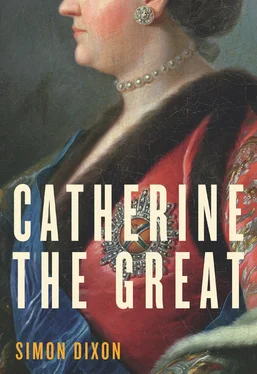* * *
It had cost Catherine more than 7 million roubles to keep Khan Shagin Girey on the Crimean throne since 1774 and by the end of the decade she was beginning to question the value of her investment. The revolt that broke out in the khanate in the winter of 1780–81 threatened to topple her handsome puppet altogether. By May 1782, he had been forced to flee to the Russian port of Kerch, at the mouth of the Sea of Azov. After Potëmkin had been sent to quell the rebellion on 1 September, Catherine outlined the clearest statement so far of the ‘Greek Project’ in a letter to Joseph II contemplating joint Austro-Russian action to deliver Europe from the Turk. But there was no hope of achieving her grandest ambitions just yet. Though her partner returned from the Crimea in late October convinced of the need for outright annexation—diplomats noticed that he was now a man with a mission—Catherine remained hesitant, anxious about the reaction of rival powers. She was brought round to his way of thinking in the spring of 1783. So long as France and Britain were paralysed by the War of American Independence, Russia had little to fear. The preliminary peace the two powers had signed in January was an added incentive not to delay. On 8 April, the empress issued a manifesto signalling her intention to annexe the strategically significant peninsula. That same month, her partner returned to the South, exasperating her this time by his prevarication. ‘I expected that the Crimea would be occupied by the middle of May,’ she complained, ‘and now here we are in the middle of July and I know nothing more about it than the Pope in Rome.’ 118
She did not have long to wait. Five days before this impatient letter was written, Potëmkin had already secured the prize. As usual, his jubilation was soon followed by physical collapse, prompting renewed anxieties in Catherine’s heart. It was to be November before he returned to St Petersburg. There, far from receiving a hero’s welcome, he found that his triumphs had merely intensified his rivals’ jealousies. Their resentments seemed to affect the empress, who treated him with unanticipated coolness. From then on, he was to spend more and more time in the South. On 2 February 1784, Catherine appointed him Governor General of the new province of the Tauride, incorporating the former Crimean khanate. The tensions between her and the prince were partially resolved by a division of spoils which made him the effective ruler of some of the most productive lands in her empire.
No sooner had this crucial relationship been resolved than another old friendship, potentially no less difficult to handle, was reignited. After a long period of residence in Europe, during which her son had studied at the University of Edinburgh, Princess Dashkova returned to St Petersburg. Her reception at Tsarskoye Selo on 10 July 1782 marked the beginning of a renaissance at Court that lasted, with varying degress of intensity, for the remainder of the decade. 119On 24 January 1783 Dashkova was unexpectedly named as director of the Academy of Sciences in succession to the ineffectual Sergey Domashnëv. As Isabel de Madariaga has written, ‘it was a tribute to Catherine’s perception and to her disregard for current prejudices, that she appointed a woman to take charge of an institution regarded as a male preserve. It was also a way of keeping a busybody busy.’ 120Lacking nothing in nerve and determination, Dashkova set to work with her customary tactless vim. Led into the hall by the mathematician Leonhard Euler, the most distinguished scientist to work in eighteenth-century Russia, then in the final year of his life, she presided over her first meeting less than a week after her appointment. It took all the organisational ability she could muster to tackle the Academy’s mounting debts, revitalise its publishing activity, organise public lectures and reform its creaking administration. 121Impressed by the rapid results, Catherine appointed her later in the year to preside over a new Russian Academy tasked with producing a dictionary of the Russian language (its first six volumes were published between 1789 and 1794). It was in Dashkova’s new journal, The Companion of Lovers of Russian Literature (1783–4), that the empress published her first essays on Russian history, a subject that was to remain a more or less constant preoccupation for the rest of her life. But it was too much to hope that Dashkova’s return would be trouble free. It was not long before her ambitions for her son put her at loggerheads with Alexander Lanskoy.
* * *
En route to Mogilëv in 1780, Cobenzl had reassured Joseph II that Lanskoy belonged to ‘that species of favourite, who are frequently subject to change, have no influence on affairs, and who limit themselves to making their fortune and that of all those who belong to them’. 122The twenty-two-year-old major general certainly relished the trappings of office, strutting about at Court ‘dressed most magnificently with a shoulder knot of fine brilliant diamonds’. True to form, he ‘leapt like a hind’ when he learned that Gustav III planned to invest him with the Grand Cross of the Order of the Polar Star. 123To Catherine, however, the dashing young Sashinka was no mere trinket. Her relationship with him was the closest she came to repeating her experience with Grigory Orlov, except that Lanskoy lacked Orlov’s streak of ruthless courage and both she and Potëmkin always treated him like a child in a gilded cage.
After Catherine’s roller-coaster ride with Potëmkin—‘the leading nail-biter in the universe’ 124—life with Sasha Lanskoy must have seemed reassuringly undemanding. It was certainly less competitive. Catherine’s illegitimate son, Aleksey Bobrinsky, who paid regular visits to the Winter Palace during his time at the Cadet Corps, caught the prevailing balance of power in a note on a game of billiards in 1782: ‘She won the game, then started another one and began to win again. She told me to finish the game for her, and I won it.’ 125Dashkova recalled a scene in which a petulant favourite allegedly tried to deter the empress from giving her a treasured bust he regarded as his own: ‘“But this bust is mine,” exclaimed Lanskoy in protest. “It belongs to me.”’ 126Sasha, however, was a ‘golden individual’, accustomed to such ‘sacrifices’. It was presumably easier to regard them with equanimity when Quarenghi was not only designing a house for him at Sofia, but also working on a grandiose palace at Velë, the estate Catherine had bought for him in Pskov province. Sent there to plan the park, the Scot James Meader, who had designed the English Park at Peterhof, found that ‘the spot where the gardens are to be is very fine laid & planted by nature so that it only wants a little polishing & planting to complete it’. 127Lanskoy was just as keen to share the empress’s passion for engraved gemstones. She tried to stimulate his literary interests, too. As the sceptical French chargé noted in September 1780, ‘He has just been bought a library for 10,000 roubles, which he certainly will not read.’ 128
Lanskoy’s support was more emotional than intellectual. As she approached her mid-fifties, Catherine faced the loss of some of her closest companions. When she learned of General Bauer’s fatal illness in the autumn of 1782, she complained to Dr Rogerson that ‘there was scarcely a doctor who knew how to cure even the bite of a bed-bug’. Bauer’s death on 11 February prompted ‘great floods of tears for many days’. 129Though the carnival continued all around her—3130 nobles and merchants attended the masked ball at the Winter Palace on 17 February—it was almost three weeks before the empress could bear to break the news to Grimm, a sure sign of the depression which often afflicted her at times of personal despair. 130Before making her annual confession at the end of the first week of the Great Fast, she quipped bleakly to her souffre-douleur that the ‘bovine medics’ had seen off ‘yet another person who has been close to me for thirty-three years’. Only Monsieur Tom, a favourite greyhound, was safe—‘he who has no use for any doctor’. 131At the end of March, Panin, who had had ‘one foot in the grave’ since his sacking in 1781, finally breathed his last. And worse was to come. Since the autumn, the empress had been nursing Grigory Orlov, whose descent into insanity after the death of his wife disturbed all who witnessed it. ‘One cannot see him in this state without pity,’ Zavadovsky admitted. 132Refusing to have her patient confined, Catherine tended him with unfailing compassion. ‘His wild and incoherent discourse ever affect her to tears,’ Harris learned, ‘and discompose her so entirely, that for the remainder of the day she can enjoy neither pleasure nor business.’ 133Though the end, when it came in Moscow on 11 April, was a blessed release, it was no less shocking for that. On hearing the news at Tsarskoye Selo just before her fifty-fourth birthday, Catherine confessed ‘the most acute affliction’ to Grimm. In Orlov, she had lost ‘a friend and the man to whom I have the greatest obligations in the world… General Lanskoy is tearing himself apart to help me bear my grief, but that makes me melt even more.’ 134‘It has been a black year for me,’ she admitted to Potëmkin when Field Marshal Golitsyn went to his grave in October: ‘It seems that whoever falls into Rogerson’s hands is already a dead man.’ 135
Читать дальше












